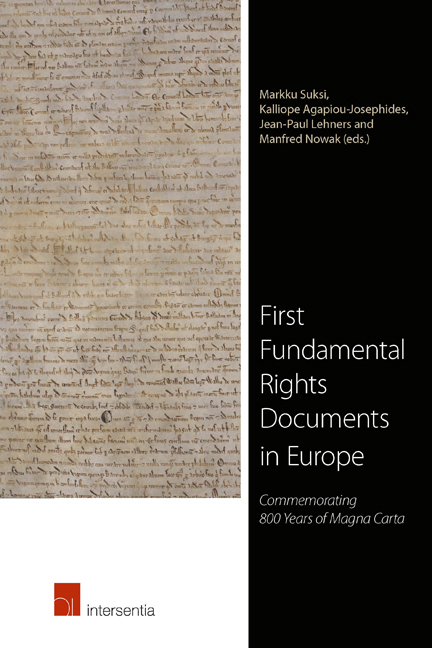Book contents
- Frontmatter
- Preface
- Contents
- List of Authors
- 1 Introduction
- PART I
- 2 The United Kingdom: From Magna Carta 1215 to the Rule of Law
- 3 Ireland: Individual and Group Rights in Ancient Irish Law
- 4 Italy: The Liber Paradisus — A Vision of Good Governance
- 5 Hungary: The Historic Constitution as the Place of Memory
- 6 Belgium: From Collective Privileges to Individual Rights
- 7 Austria: Manorial Regulation of Mining and Use of Forests as Potential Antecedents in Fundamental Rights
- 8 Spain: The First Cry for Justice in the Americas — From Antonio de Montesinos to the Laws of Burgos (1512)
- 9 Lithuania: From Equality to Inequality and to Equality Again
- 10 Poland: From the Golden Liberty of the Nobles to Fundamental Rights
- PART II
- Index
6 - Belgium: From Collective Privileges to Individual Rights
from PART I
Published online by Cambridge University Press: 15 December 2017
- Frontmatter
- Preface
- Contents
- List of Authors
- 1 Introduction
- PART I
- 2 The United Kingdom: From Magna Carta 1215 to the Rule of Law
- 3 Ireland: Individual and Group Rights in Ancient Irish Law
- 4 Italy: The Liber Paradisus — A Vision of Good Governance
- 5 Hungary: The Historic Constitution as the Place of Memory
- 6 Belgium: From Collective Privileges to Individual Rights
- 7 Austria: Manorial Regulation of Mining and Use of Forests as Potential Antecedents in Fundamental Rights
- 8 Spain: The First Cry for Justice in the Americas — From Antonio de Montesinos to the Laws of Burgos (1512)
- 9 Lithuania: From Equality to Inequality and to Equality Again
- 10 Poland: From the Golden Liberty of the Nobles to Fundamental Rights
- PART II
- Index
Summary
INTRODUCTION
Belgian constitutional law is usually associated with complex forms of federalism. If it is discussed in international legal scholarship, the focus is almost exclusively on the way the once Unitarian state has been gradually redesigned into a federal state with even some confederal features. Little attention is paid to the way fundamental rights are protected in the Belgian legal order. On the one hand, this is unsurprising given that Belgian constitutional law did not play a leading role in this field in the twentieth century. On the other hand, the omission is regrettable, as the Belgian constitutional rights catalogue has a long-standing pedigree.
In this chapter we will recall that the Belgian Constitution of 1831 was a leading document at the time of its adoption. The constitutional fathers, who themselves experienced the inconveniences of ‘enlightened despotism’, stressed the importance of solid protection of fundamental rights, especially in relation to executive power. What they feared most was arbitrary interference by public authorities in the exercise of fundamental freedoms. This idea corresponded very well with the then very popular idea of the minimal state.
This nineteenth century discomfort with, if not distrust of, public authorities was also fuelled by the romantic idea of a ‘rebellious past’. In their relationship to central authorities, mostly of foreign origin, the local forces of power (e.g. the cities) had enjoyed a certain degree of autonomy since late medieval times. To the extent that they were represented by the Estates, citizens were given, albeit in a very hesitant way, the enjoyment of some ‘fundamental’ rights, guaranteed by medieval Charters. These texts can be seen as the local ‘pendants’ of the Magna Carta.
THE CONSTITUTIONAL TRADITION IN THE ANCIENT REGIME
PLURALISM AND DIVERSITY
The history of constitutionalism in Belgium before the revolutions of 1789 and 1830 is essentially pluralistic in nature. There are at least three reasons for that. One obvious factor is a phenomenon that can be observed across Europe in the ancien régime, namely the prevalence of collective privileges related to social class or personal status over the notion of individual rights applying indiscriminately to any single human being by virtue only of his birth in a democratic state. The rights, or rather privileges, defended in the ancient constitutional texts pertain to the estates, that is representatives of collective groups such as towns, the nobility and the clergy.
- Type
- Chapter
- Information
- First Fundamental Rights Documents in EuropeCommemorating 800 Years of Magna Carta, pp. 69 - 84Publisher: IntersentiaPrint publication year: 2015



